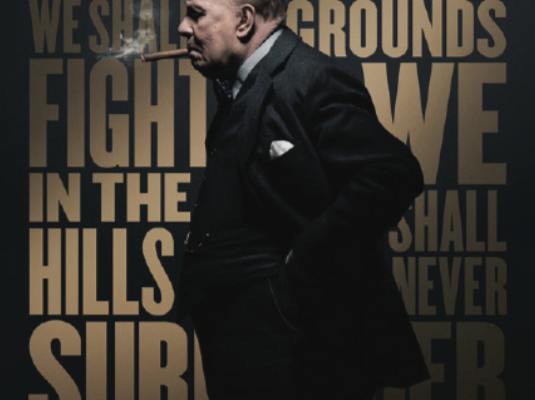‘Darkest Hour’ makes for an entertaining account of England’s history

By Nick Bainbridge//News Editor
The film “Darkest Hour” presents Churchill as a complex and dramatic character unlike any protagonist we have seen before. It focuses on the story of Churchill’s rise to prominence and how his actions determined the fate of the world.
The primary focus of the movie is less on the conflict between the British and the Germans, but between Churchill and his opposition in Parliament about what to do about the Nazi invasion of France. I was fascinated by the scheming of Neville Chamberlain and Viscount Halifax, who were Churchill’s primary antagonists, despite both of them being conservatives. Unlike many antagonists in contemporary films, the audience could understand their motivation, as they only wanted to secure England’s safety.
What did disappoint me was the lack of attention on the liberal party. The reason given for Churchill being selected as Prime Minister was that he was the only person the liberals would accept, yet aside from that, the liberal party as a group had no direct impact on the plot despite making up a significant portion of Parliament. If their actions were as irrelevant in reality as they seem to be in the film, then perhaps it would have been wise to include a scene that pointed this out. While much of the movie focuses on the serious politician who made difficult choices for the security of his nation, the film has moments where it deviates from one’s expectations.
There is a surprising amount of humor spread throughout the story. In some scenes, Gary Oldman, the actor who played Winston Churchill, acted as a bumbling, impulsive old man who did not take things seriously. At first I felt that these sections of the film were out of place, as they conflict greatly with the melancholic moments of loss and fear. But as the story continued, I realized that these characterizations made Churchill more relatable. Wright’s Churchill is not a paragon, but a multifaceted character who eats, laughs and makes obscene gestures. This effectively established that he was still only human despite having the weight of the world on his shoulders.
I would be remiss not to mention Lily James and her role of Churchill’s secretary Elizabeth Layton. I found James very convincing in her portrayal as someone struggling with an unorthodox work environment. She served as the voice of the everyday British citizen, as opposed to that of the aristocrats arguing in Parliament, which adds a unique perspective that is essential to understanding the story. She also served as someone for Churchill to speak to and explain his plans, which is a much more engaging way to tell exposition than through narration.
Without the inclusion of Elizabeth Layton and her role as voice of the average British citizen, my intrigue into “Darkest Hour” may have grown stale, as it would be difficult to picture the direct impact that Parliament and the War Court’s decisions had on the English people.
Overall, I was surprised by the quality of “Darkest Hour” and found it to be a brilliantly crafted story about a difficult time in England’s history.